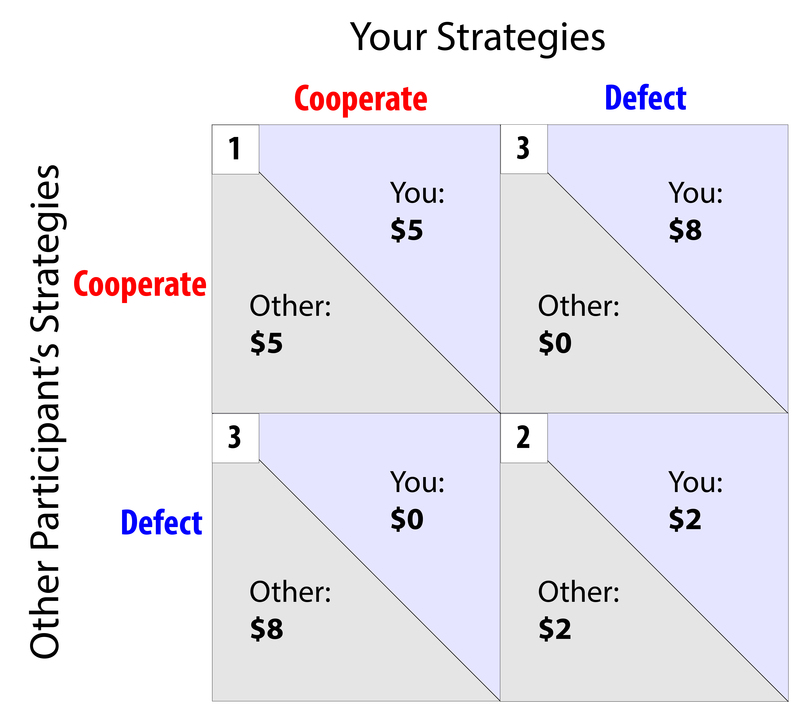Cooperation
Cooperation refers to the ability of humans to work together toward common goals and is required for survival. Groups with better member cooperation were more likely to survive (Bowles et al., 2012). As we learned earlier (see Chapter 2) cooperation occurs in non-human primates (e.g., chimpanzees, bonobos) but it is almost exclusively limited to kin and is almost never extended to strangers (Melis & Semmann, 2010). Some psychologists believe that complex cooperation among humans is related to psychological processes like empathy, trust, group identity, memory, shared intentionality and culture (Matsumoto & Juang, 2013; Moskowitz & Piff, 2018).

Our ability to understand someone’s emotional experience, empathy, occurs when we take on perspective of the person and try to understand his or her point of view. When empathizing with a person in distress, the natural desire to help is often expressed as a desire to cooperate. Trust is the belief that another person’s actions will be beneficial to one’s own interests (Kramer, 1999) which enables us to work together as a single unit. When it comes to cooperation, trust is necessary and critical (Pruitt & Kimmel, 1977; Parks, Henager, & Scamahorn, 1996; Chaudhuri, Sopher, & Strand, 2002); however, our willingness to trust others depends on their actions and reputation. One common example of the difficulties in trusting others that you might be familiar with is a group project for a class. Many students dislike group projects because they worry about social loafing, the way that one person expends less effort but still benefits from the efforts of the group.
Over time, individuals develop a reputation for helping or for loafing. Willingness to cooperate with others depends on their prior actions and reputation and our memory of the events. Nowak and Sigmund (1998) demonstrated with a mathematical model that a person with a reputation for helping gets help later on, regardless of whether they provided help to you directly in the past. In a study that used an economic game, found that as the game progressed donations (help) were more frequently given to individuals who had been generous in earlier rounds of the game (Wedekind & Milinski, 2000). Individuals who were perceived as cooperative gained a reputational advantage, earning them more partners willing to cooperate and a larger overall monetary reward.
There are cultural differences in the belief about the goodness of people, which can be seen as a measure of trust. High trust refers to positive expectations about the behaviors of others (returning a lost wallet) and low trust refers to negative expectations about the behaviors of others (keeping a lost wallet). High trust societies are more likely to cooperate without sanctions (punishment); however, there is a lot of variation in cooperation across cultures (Gatcher et al., 2010) and willingness to sanction group members is moderated by factors like social norms, country gross domestic product (GDP) and individual reputation (whether someone has helped in the past) (Balliet & Van Lange, 2013).

Economists and psychologists often use the Prisoner’s Dilemma to examine cooperation and competition experimental studies. In the prisoner’s dilemma, the participants are shown a payoff matrix in which numbers are used to express the potential outcomes for the each of the players in the game, given the decisions made by each player. The payoffs are chosen beforehand by the experimenter in order to create a situation that is similar to a real-world outcome and are normally arranged so that each individual is better off acting in his or her immediate self-interest. If all individuals act according to their self-interest, then everyone will be worse off. Yamagishi (1986, 1988) categorized Japanese and American participants into low trust and high trust categories and then asked them to take part in an experiment where they could give other participants money (a variation of the prisoner’s dilemma). High trusters provided more cooperation without the presence of sanctions and low trusters provided more cooperation with sanctions. Culture variation in levels of trust (high/low) is present within and across cultures. It appears that across cultures punishment promotes cooperation of social loafers in societies with high trust more than low trust societies (Balliet & Van Lange, 2013). High trust cultures are more willing to punish social loafers. Low trust cultures may not share the social norm of ‘no free rides’ so punishment isn’t going to work in those situations.

Group identification can strongly influence cooperation and people are generally reluctant to cooperate with members of an out-group, or those outside the boundaries of one’s own social group (Allport, 1954). Matsumoto and Hwang (2011) used the Prisoner’s Dilemma to examine whether cultural differences were related to intercultural (between cultures) competition and cooperation. Researchers used the prisoner’s dilemma to test their hypothesis. Students were paired as same-sex and same ethnicity or same sex but different ethnicity. The pairs with different ethnicities had fewer cooperative behaviors and more competitive behaviors.
Using a variation of the Prisoner’s Dilemma among small-scale subsistence societies revealed that the interdependence of a group (i.e., relying on one another for survival) predicted the likelihood of cooperation. For example, among the people of the Lamelara in Indonesia, who survive by hunting whales in groups of a dozen or more individuals, donations in the ultimatum game were extremely high, approximately 58% of the total sum. In contrast, the Machiguenga people of Peru, who are generally economically independent at the family level, donated much less on average, about 26% of the total sum. The interdependence of people for survival, therefore, seems to be a key component of why people decide to cooperate with others (Henrich et al., 2001).
Cooperation is an important part of our everyday lives and even though cooperation can sometimes be difficult to achieve, certain practices, such as emphasizing shared goals and engaging in open communication, can promote teamwork and even break down rivalries. Though choosing not to cooperate can sometimes achieve a larger reward for an individual in the short term, cooperation is often necessary to ensure that the group as a whole is successful.

